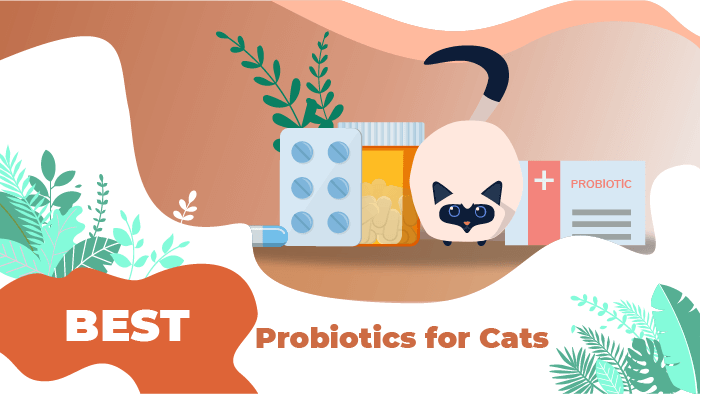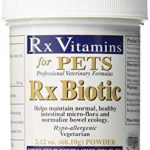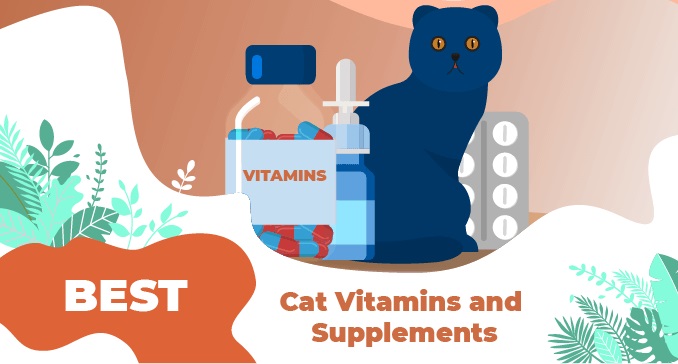Best Probiotics For Cats
This page contains affiliate links. We may earn money or products from the companies mentioned in this post through our independently chosen links, which earn us a commission.
Probiotics are a hot topic today, not just in human health but also in feline diets.
What are they? How are they different from prebiotics? Can they help your cat? Should you add them to your cat’s diet?
Which are the best probiotics for cats? Is it okay to give your cat probiotics made for humans? We can answer all of these questions and more about probiotics for cats.
What Are Probiotics For Cats?
Believe it or not, most of your cat’s immune system is in his digestive tract.
This is also true for humans and canines. Your cat’s digestive tract has lots of “friendly” bacteria that help regulate his digestion and contribute to his overall health.
Keeping your cat’s GI tract balanced with good bacteria can help your cat stay healthy.
This can be especially important for kittens, elderly cats, and any cat that is dealing with a health problem.
If your cat has an upset stomach, diarrhea, if he takes antibiotics, or if something else kills off some of the friendly bacteria in his gut, your cat may need a boost with some additional good bacteria.
Cats boarding or staying in shelters, traveling with your cat, or changing her diet are all things that can lead to gastrointestinal upset for cats.
That’s where probiotics can help your cat. These microorganisms can add friendly bacteria to your cat’s GI tract to help restore the good bacteria.
Adding more good bacteria can often help your cat overcome things like diarrhea and other illnesses.
Probiotics Or Prebiotics?
Probiotics are bacteria. Live bacteria in the form of microorganisms are given to the cat (or human or dog) and there are benefits to the digestive system, immune system, and other parts of the body.
Prebiotics are totally different. They are food ingredients that can’t be digested. However, they feed or stimulate the growth of bacteria in the GI tract.
Chicory root, bananas, apples, and lots of other foods are natural prebiotics, though your cat is unlikely to eat them.
You may find nutrient forms of prebiotics in many cat foods since they are good for the bacteria in your cat’s GI tract.
What Are The Benefits Of Probiotics For Cats?
Studies of probiotics for cats are ongoing so some of the benefits are still being weighed. The studies that have been done so far show some positive effects for cats.
There is some evidence that stress-induced diarrhea may be prevented by giving probiotics.
For cats with acute diarrhea, there is some evidence that probiotics by themselves can help clear up the condition. Some cats seem to respond better than others to probiotics for acute diarrhea.
If your cat is having problems with acute diarrhea, feeding a prescription diet while giving probiotics could be more effective.
For cats with chronic intestinal problems, there have been few studies.
One study of cats with chronic diarrhea found that cats that were given probiotics had improved stool firmness in 72 percent of cats.
There have been few studies of giving probiotics to kittens but one study found that during an outbreak of acute diarrhea in kittens only 9.5 percent of the kittens required anything more than the probiotics to clear up the condition.
Among kittens that did not receive probiotics, 60 percent of them needed more treatment.
There are more studies for the effects of probiotics in dogs and more conclusive evidence that probiotics do help with gastrointestinal health.
No studies have found any serious adverse effects when probiotics are administered to healthy animals. This suggests that they are safe to use.
Many veterinarians do recommend that their clients give their cats probiotics but they largely base their beliefs on anecdotal evidence instead of conclusive studies.
At this time, probiotics for cats are most commonly recommended for cats that have sudden cases of diarrhea; and for cats that have finished taking a course of antibiotics. Antibiotics are known for killing off the bacteria in the gut – both friendly and “bad” bacteria.
Giving your cat probiotics after he has finished taking all of his antibiotics can help his gastrointestinal system begin to regrow healthy bacteria in his GI tract and restore his immune system.
Note that it doesn’t do any good to give your cat probiotics while he is still taking antibiotics because they will kill off any friendly bacteria that the probiotics add to your cat’s GI tract.
Many cat lovers also like to add probiotics to their cat’s regular diet to make sure their cat has plenty of friendly bacteria in their GI system.
Many people, including veterinarians, believe that probiotics can help strengthen a cat’s overall immune system.
Some veterinarians believe that cats can benefit from probiotics even more than dogs because of the differences in their anatomy and diet.
Can You Give Your Cat Probiotics Made For Humans?
If you search online you will find many cat lovers who confess to giving their cats probiotics made for humans.
There don’t appear to be any current studies that show it’s dangerous to give cats human probiotics.
However, many veterinarians still recommend that cat lovers choose a probiotic that is specially made for cats.
Cats and humans have different microflora in their intestines so the probiotics that work for humans may not be very effective for cats.
Their is probably some overlap in terms of gut bacteria, but your cat has bacterial strains in his GI tract that you don’t have.
Not all veterinarians trust probiotics made for pets, however. Some vets do recommend using human probiotics if for no other reason than they have more confidence in them.
Which Cat Probiotics Does Your Cat Need?
Cats appear to respond best to probiotics which contain strains of the Bifidobacterium and Enterococcus families. Bifidobacterium usually lives in the cat’s small intestine; while Enterococcus usually lives in the large intestine (colon).
This means that each probiotic strain performs a different function. Bifidobacterium works on digestion and Enterococcus helps your cat form normal feces.
If the probiotic you buy has other strains that shouldn’t be a problem but you should look for a product that contains at least these two strains.
Diversity is good. There could be several different kinds of Enterococcus or Bifidobacterium included in the product.
It’s also recommended that you choose a product with the highest CFU (colony forming units) available.
The more the merrier when it comes to the microorganisms in probiotics. Your cat will get more benefits from this kind of probiotic.
Yes, these are live microorganisms even if they don’t look very impressive in powder or pill form.
They are more or less hibernating until they enter your cat’s intestines.
Be sure to check the label of the product for the “Best By” or “Sell By” date. A single probiotic pill or packet of powder can contain millions of microorganisms so even if a few of them are already dead, there should be more than enough to be good for your cat’s GI tract.
Probiotics for cats come in lots of different forms such as pills, powders, and even mixed inside treats. You can choose the form that will work best for your cat.
The supplement industry is not very closely regulated so if you want to try to choose a safer product you can look for one that has a label from a veterinary organization called the National Animal Supplement Council (NASC). This organization tries to provide some oversight for pet supplements.
On the other hand, if you are looking at cat foods that contain probiotics as ingredients, things are a little murkier.
Canned cat foods undergo a very high temperature during their cooking process. It’s very unlikely that any probiotics in a canned food would live through the process so if you see a canned food that claims to contain probiotics, read the claim carefully. It might be a fib. At the very least, you need to investigate further.
Dry cat foods can contain live probiotics but you must check the “Best By” or “Sell By” dates to make sure the microorganisms could still be viable.
Even if the probiotics could still be alive, some cat foods sit on hot shelves for months; or they are shipped in difficult weather conditions that might kill the probiotics.
For the most part, if you want to make sure that your cat is getting a good probiotic, you’re better off buying probiotics in supplement form.
Compare Best Probiotics For Cats
|
Overall Best
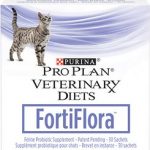
1. Purina Pro Plan Veterinary Diets FortiFlora Probiotic Gastrointestinal Support Cat Supplement |
Best Supplement for Dog & Cat
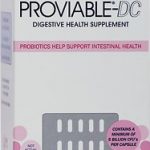
3. Nutramax Proviable-DC Capsules Dog & Cat Supplement |
Best For Sensitive Stomach
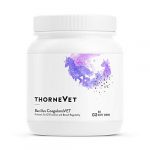
5. ThorneVet Bacillus CoagulansVET – Gastrointestinal Support for Dogs, Cats & Horses |
||
|
Life Stage
Adult |
Life Stage
Adult |
Life Stage
Adult |
Life Stage
Adult |
Life Stage
Adult |
|
Form
Powder |
Form
Pearl |
Form
Capsule |
Form
Powder |
Form
Capsule |
|
Microorganisms
100,000,000 CFU/g |
Microorganisms
300,000,000 CFU/g |
Microorganisms
500,000,000 CFU/g |
Microorganisms
100,000,000 CFU/g |
Microorganisms
|
|
Count
30/180 packets |
Count
60 Pearls per bottle |
Count
30/80 count |
Count
One Size |
Count
60 Capsules |
Purina Pro Plan Veterinary Diets FortiFlora Probiotic Gastrointestinal Support Cat Supplement
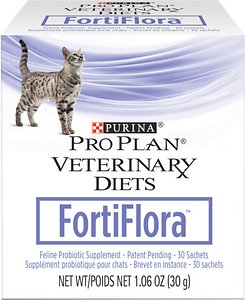
Product Info
- Life Stage: Adult
- Form: Powder
- Microorganisms: 100,000,000 CFU/g
- Count: 30/180 packets
It contains Enterococcus faecium which specifically addresses diarrhea. It has 1 X 108 CFU/g of this probiotic with a guaranteed level of live microorganisms to promote normal intestinal microflora and a healthy immune system for your cat.
That’s 100 million colony forming units per packet. Fortiflora comes in 30 convenient single packets so you can sprinkle a packet on your cat’s food each day. This probiotic does require a prescription from your veterinarian.
PRO-Pets Probiotics for Dogs and Cats
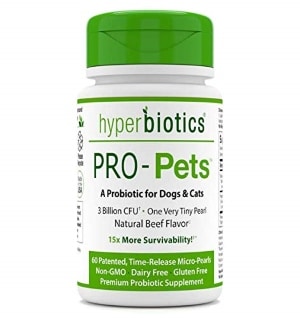
Product Info
- Life Stage: Adult
- Form: Pearl
- Microorganisms: 300,000,000 CFU/g
- Count: 60 Pearls per bottle
It’s called an “advanced probiotic medical food” and the version recommended by veterinarians is unflavored. This probiotic comes in a powder form. This product does require a prescription from your veterinarian.
Nutramax Proviable-DC Capsules Dog & Cat Supplement

Product Info
- Life Stage: Adult
- Form: Capsule
- Microorganisms: 500,000,000 CFU/g
- Count: 30/80 count
Rx Vitamins Essentials for Pets

Product Info
- Life Stage: Adult
- Form: Powder
- Microorganisms: 100,000,000 CFU/g
- Count: One Size
Rx Biotic powder is hypoallergenic and very palatable. It mixes easily with your cat’s food. The product also contains prebiotics to help friendly bacteria grow once it is introduced into your cat’s GI tract.
ThorneVet Bacillus CoagulansVET – Gastrointestinal Support for Dogs, Cats & Horses
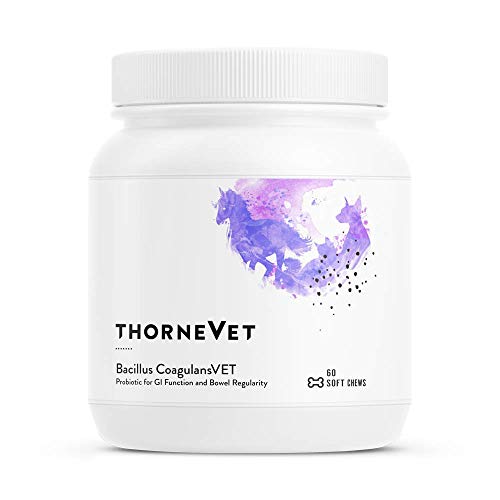
Product Info
- Life Stage: Adult
- Form: Capsule
- Count: 60 Capsules
There are advantages to using a bacteria from the soil and some vets report great results with this probiotic. This product also doesn’t have to be refrigerated. It has 2 billion colony forming units per capsule.
Conclusion
More and more cat lovers, as well as veterinarians, are becoming interested in the benefits of probiotics for cats. Whether your cat has an acute case of diarrhea, problems with stress, or you are interested in building her immune system, adding probiotics to your cat’s diet could be very helpful.

